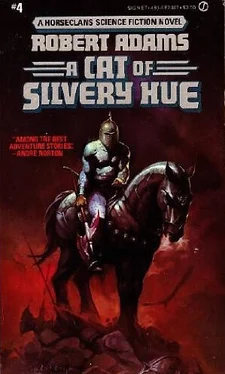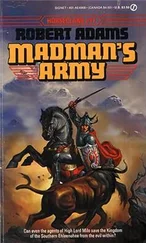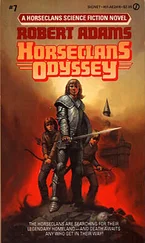First a wedge of rampart collapsed back into the inferno, then an arc several yards in length, next another longer one. And suddenly the pillar of dust and smoke became higher and denser as the entire remaining stretch of ramparts slid crashing into the huge, blazing pit, sending unbelievable showers of sparks scintillating upward.
Bill’s mindspeak halted the mare, Ahnah, at the lip of the deep crater. Other men crowded up in his wake, despite the waves of enervating heat, the clouds of choking smoke and the nauseating stench of burning flesh which assailed them.
At first, the young thoheeks could spot no trace of the hundred-odd men who had been atop the rampart when it went down. It was with a shock that he realized that one of them lay almost at his feet. “By his armor, the man appeared to be an officer—and condemned to an agonizing, singularly unpleasant death.
A massive timber—probably one of those which had pillared the huge, elaborate trap—lay across the unfortunate’s legs. The farther end of the timber was already blazing, and several feet more had commenced to smoke and smolder.
Pawl Raikuh touched his lord’s arm. “Duke Bili, I could take two or three men and try to get him out… T
Bili shook his head sadly. “No, Pawl, that would do no good. Look at that timber, man! There must be a full Harzburk ton of hardwood there. It would take a score of men to raise it and a couple more to pull the officer free.”
“We’ve got that many, Duke Bili,” averred Raikuh. “For all he’s one of those damned spit-and-polish popinjays, he’s still a man.”
Bili cupped his hands to his mouth and shouted down, “Can you hear me, soldier? There’s no way we can safely get to you. Enough men to shift that timber might start that mess to sliding again. It might kill all of them.”
Below, the bloody, dirt-caked head could be seen to nod wearily.
Bili went on. “The timber is already on fire, man. You’ll slowly roast alive, if you don’t cut your throat.”
The trapped man’s hand fumbled uncertainly at his waist but came away empty. Apparently his belt had been torn off, and with it had gone his dirk. His position made it impossible to draw the long broadsword strapped across his back. Frantically, he pushed at the dead weight of rough-hewn wood which would shortly be the agent of his torturous death. But he could as easily have shifted a mountain, and presently he slumped back, defeat mirrored on his battered countenance.
Bili groaned. “Pawl … somebody, Sun and Wind, get an archer or dartman up here! We can’t just allow the poor bastard to die like that.”
A number of Freefighters drew, hefted, then threw their dirks, but the blades all fell short. Only three feet from the officer, a section of the timber puffed a great blob of smoke, then small, bluish flames began to crackle over its surface.
Geros could never until his dying day explain his actions then. He had always harbored an intense fear of fire. Yet suddenly he found himself ripping at the laces of his armor, doffing both it and his helm, pushing resolutely through the men at the lip of the crater, and cautiously beginning to pick his way down the treacherous slope of almost fluid earth, loose stones and jagged pieces of lumber.
He heard the surprised shouts of his comrades, almost drowned by Raikuh’s roared command, “Damn your wormy guts, Geros! Come back here!”
Geros had never felt such heat. Above it came in waves, but here it was a solid wall which engulfed from all sides, searing exposed flesh and setting even his sweat-soaked gambeson to smoldering. The oven atmosphere tortured both throat and lungs, so he breathed as shallowly as he could.
Through the wavering heat and rolling smoke, he saw his objective and gingerly made his way toward it, for all that the thick soles of his jackboots seemed hot as live coals, and beneath the leather and steel protecting his shins and knees, he felt his legs roasting.
Then the officer was within arm’s reach. Smiling! The teeth startingly white in that mask of dirt, blood and blisters.
“You … brave man … Freefighter,” the officer gasped. “Wish … could’ve known you. Give … your dirk now. Get out … here! Here … wait.” He fumbled a large signet from off his left thumb. “Take … my father. Ahrkeethoheeks Lehzlee … will reward you. Tell him … died in honor.”
“And that man,” remarked Bili to no one in particular, “was worrying a few hours agone that he’d pissed his breeks a few times in combat.”
“If I can raise the timber a little, my lord, can you pull yourself from beneath it?” Geros shouted above the roar of the flames and the crash and rumble of the still-settling stones and timbers.
“You … mad … man!” moaned the officer. “Dozen men … more … couldn’t. Give your dirk. Go back!”
To those above, it was like some fanciful tale of olden days when all men were as gods, when all men could work miracles and all nature served mankind unstintingly. They saw, through the heat waves, the sergeant burrow in the soft, steaming earth beneath the short end of the massive timber, get his hands beneath it and slowly, straining with legs, back and shoulders, heave at it. And it rose!
Not far, true, but rise it did. And scrabbling for leverage, the officer hastily worked himself from the hollow which his body and legs had imprinted in the torrid earth.
There was no dearth of willing hands to assist the injured officer and the thoroughly singed and utterly exhausted Geros •back up the side of the crater. Men bore the officer down to where the other wounded waited. But they only stood staring at Geros where he lay, wheezing and gasping on the ground. Finally, Pawl Raikuh pushed through and put a canteen in those torn, burned hands, but not even he could find words to speak. And what shone from his eyes was less admiration than awe.
Geros could have wished a return to the old days, when he was simply a color sergeant and apprentice weapons master. He found the business of being a hero most uncomfortable. By their very nature, Freefighters were an unruly, disrespectful and basically irreverent lot. Except in combat, they would argue with noncoms, officers, captains, and any grade of nobility, deferring only to those few who had earned respect.
At first shocked to the very core of his proper being by such blatantly improper conduct, Geros had, over the months, come to enjoy and appreciate his comrades’ rude behavior and even—on rare occasions—to copy it.
But now the warm camaraderie was gone. In the week since he had rescued young Captain Lehzlee, men whose friendship he had treasured seemed distinctly ill at ease in his presence, spoke to him only when it was necessary and then in tones of deepest respect, far deeper respect than he had ever seen them show any officer or noble. Whenever he tried to join a fireside group, all conversation immediately ceased, lewd songs died on lips. So he found himself more and more alone.
He was alone when they came for him. Clumsily, because of his bandaged hands, he was trying to sharpen his fine sword. Then the tent flap was pulled aside and Raikuh said his piece stiffly, formally.
“Sergeant Geros, we are summoned to attend Duke Morguhn at the High Lord’s pavilion. At once, please.”
Then a trio of his former comrades filed meekly into the tent and assisted him to arm. When he emerged, Ahnah was waiting, fully equipped, her hide glossy with recent and thorough grooming.
After that, the bright morning became a phantasmagoria of improbable scenes and occurrences. At the perimeter of the Morguhn enclave, he and Captain Raikuh were joined by a squad of the kahtahfrahktoee of the High Lord’s guard, brilliant in plumes and tooled boots and burnished parade armor. And Geros felt like some mendicant beggar in his crestless, field-browned helm, his scarred and dented cuirass.
Читать дальше












